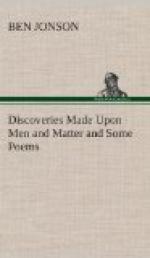What we understand by whole.—Whole we call that, and perfect, which hath a beginning, a midst, and an end. So the place of any building may be whole and entire for that work, though too little for a palace. As to a tragedy or a comedy, the action may be convenient and perfect that would not fit an epic poem in magnitude. So a lion is a perfect creature in himself, though it be less than that of a buffalo or a rhinocerote. They differ but in specie: either in the kind is absolute; both have their parts, and either the whole. Therefore, as in every body so in every action, which is the subject of a just work, there is required a certain proportionable greatness, neither too vast nor too minute. For that which happens to the eyes when we behold a body, the same happens to the memory when we contemplate an action. I look upon a monstrous giant, as Tityus, whose body covered nine acres of land, and mine eye sticks upon every part; the whole that consists of those parts will never be taken in at one entire view. So in a fable, if the action be too great, we can never comprehend the whole together in our imagination. Again, if it be too little, there ariseth no pleasure out of the object; it affords the view no stay; it is beheld, and vanisheth at once. As if we should look upon an ant or pismire, the parts fly the sight, and the whole considered is almost nothing. The same happens in action, which is the object of memory, as the body is of sight. Too vast oppresseth the eyes, and exceeds the memory; too little scarce admits either.
What is the utmost bounds of a fable.—Now in every action it behoves the poet to know which is his utmost bound, how far with fitness and a necessary proportion he may produce and determine it; that is, till either good fortune change into the worse, or the worse into the better. For as a body without proportion cannot be goodly, no more can the action, either in comedy or tragedy, without his fit bounds: and every bound, for the nature of the subject, is esteemed the best that is largest, till it can increase no more; so it behoves the action in tragedy or comedy to be let grow till the necessity ask a conclusion; wherein two things are to be considered: first, that it exceed not the compass of one day; next, that there be place left for digression and art. For the episodes and digressions in a fable are the same that household stuff and other furniture are in a house. And so far from the measure and extent of a fable dramatic.
What by one and entire.—Now that it should be one and entire. One is considerable two ways; either as it is only separate, and by itself, or as being composed of many parts, it begins to be one as those parts grow or are wrought together. That it should be one the first away alone, and by itself, no man that hath tasted letters ever would say, especially having required before a just magnitude and equal proportion of the parts in themselves. Neither of which can possibly be, if the action be single and separate, not composed of parts, which laid together in themselves, with an equal and fitting proportion, tend to the same end; which thing out of antiquity itself hath deceived many, and more this day it doth deceive.




